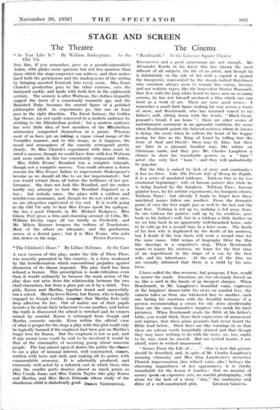STAGE AND SCREEN
The 'Theatre
THE film, if you remember, gave us a pseudo-naturalistic Arden, with glades more spacious but not less spurious than
those which the stage-carpenter can achieve, and then under- lined both the pretensions and the inadequacies of the setting by bringing assorted livestock into every scene. Miss Esme Church's production goes to the other extreme, cuts the farmyard cackle, and lands with both feet in the eighteenth century. The scenery is after Watteau, the clothes elegantly suggest the dawn of a consciously romantic age, and the Banished Duke becomes the central figure of a polished philosophic idyll. As experiments go, this one at least goes in the right direction. The forest fantasy, the Golden Age theme, are not easily conveyed to a modern audience by sticking to the Elizabethan period ; for a modern audience has very little idea of how members of the Bfizabethan aristocracy comported themselves at a picnic. Whereas most of us have got an inkling, a vague visual- image of the Versailles manner, and to this image, as it happens, the mood and atmosphere of the comedy correspond pretty closely. So Miss Church's experiment with time must be rated a success, though we could have done with less Watteau and more watts in this too consistently crepuscular Arden.
Miss Edith Evans' Rosalind was a complete triumph, though not a complete success. You could advance a dozen reasons for Miss Evans' failure to impersonate Shakespeare's heroine as we should all like to see her impersonated ; but you would retract them all before the brilliance of her per- formance. She does not look like Rosalind, and she makes hardly any attempt to look like Rosalind disguised as a boy ; but nobody cares. She plays with a sublime and mischievous assurance, and, though we do not yield at once, we are altogether captivated at the end. It is worth going to the Old Vic only to hear Miss Evans speak the epilogue. She has a good Orlando in Mr. Michael Redgrave, Miss Eileen Peel gives a firm and charming account of Celia, Mr. William Devlin rages all too briefly as Frederick, and Mr. Milton Rosmer tempers the tedium of Touchstone. Most of the others are adequate, and the production moves at a decent pace ; but it is Miss Evans who puts this Arden on the map. PETER FLEMING.
"The Children's Hour." By Lillian Hellman. At the Gate A FILM version of this play, under the title of These Three, was recently presented in this country, in a form weakened by the bowdlerisation which conventional prejudice against discusskn of its theme imposed. The play itself has been refused a licence. This proscription is mose.ridiculous even than it would ordinarily be because the main action of the play does not arise from the relationship between the two chief characters, but from a gloss put on it by a third. Two girls, Karen and Martha, together found and successfully run a school. Martha loves Karen, but Karen, who is happily engaged to Joseph Cardin, imagines that Martha feels only deep affection for her. Out of malice one of their pupils invents a lie about their behaviour to one another, and before the truth is discovered the school is wrecked and its owners ruined by scandal, Karen is estranged - from Joseph and Martha commits suicide. Even within the official view of what is proper for the stage a play with this plot could only be logically banned if the emphasis had been put on Martha's tragic love for Karen. But the emphasis is not so put, and if any moral issue could be said to be involved it would be that of the criminality of inventing gossip about- innocent people. The ban placed upon it denies the public the-chance to see a play of unusual interest, well constructed, sincere, written with taste and skill, and making all its points with commendable economy. It is admirably produced, and extremely well acted by a talented cast in which those who play the smaller parts deserve almost as much praise as Miss Ursula Jeans and Miss Valerie Taylor who play Karen and Martha, and Miss Mavis Edwards whose study of the slanderous child is diabolically good. DBREIC VERStROYLE.




























































 Previous page
Previous page